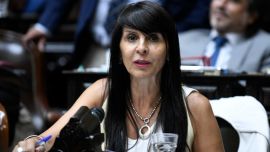Protests are part of democratic life, or at least that's the way it was supposed to be before the age of fake news and constant agitation. Protesting is a right. Trying to figure out the significance of a specific protest is another matter.
A nationwide anti-government demonstration was staged on Monday (a national holiday) in the middle of a pandemic directed against President Alberto Fernández's quarantine measures and a plan to reform the judicial system. Critics claim that the reform is part of a plan masterminded by Vice-President Cristina Fernández de Kirchner to free herself from the corruption cases she still faces in court.
The flag-waving protest was loud in downtown Buenos Aires City. Hundreds protested outside the presidential residence in Olivos too. Ask the confrontational wing of the centre-right opposition coalition, Juntos por el Cambio, and Monday's display of exasperation illustrates that the vast majority of the population is now fed up with the government already, less than a year after it took office.
Former president Mauricio Macri, who was defeated by Fernández last year, was interviewed by a cable television news channel on Monday night after staying mum for a long time. Was he trying to capitalise on the protest? The glitch for the former president is that not all of the centre-right coalition is happy about the angry tone of the demonstrations and Macri's Monday night zeal for outright confrontation. Opposition leaders like Buenos Aires City Mayor Horacio Rodríguez Larreta are less eager to sponsor the quarantine-breaching motorcades and rub shoulders with the flag wavers. The nascent rift in the opposition coalition will not go away if Macri now tries to grab the limelight away from the mayor, who outperforms the former president in public opinion polls.
In his interview, the former president blamed the political wing of his coalition for failing to hammer out deals with the moderate Peronist governors while he was in office. Many of those questioned officials have a Peronist background and Macri said in retrospect he should have personally engaged in negotiations with Peronist governors about reforms. He also accused Fernández de Kirchner, the leader of the powerful leftist Kirchnerite wing of the ruling coalition, of “kidnapping” the Peronist movement. During her 2007 to 2015 spell in office, the two-term ex-president had disagreements with many Peronist governors.
The anti-government protest hits the Fernández administration at a time it is still struggling to deal with the economic wreckage caused by the pandemic. Critics say that the president’s quarantine is to blame for the collapse and not the coronavirus itself.
There is speculation that Fernández de Kirchner and others are also dissatisfied with the performance of Alberto Fernández’s Cabinet. Rumours about an imminent reshuffle refuse to go away and suddenly many ministers are doing more talking. The president has confirmed that there is plenty of “debate” in the Cabinet about how to best deal with the economic malaise, but that Economy Minister Martin Guzmán has the last word. Still other officials, including Deputy Cabinet Chief Cecilia Todesca, are increasing their profile and granting interviews to discuss economic policies.
In one way, the problem for the ruling coalition is that it can't call its own demonstration to counter the protests because that would go against the government’s own quarantine rules. Today, October 17, Peronist Loyalty Day marks the spontaneous workers' demonstration in 1945 that paved the way for Juan Perón's rise to power. The ruling coalition intends to flood social media with messaging, encouraging support for the government.
The problem for the opposition meanwhile is that Macri's fierce public criticism and calls by angry demonstrators for the president to be booted out are making moderate Peronists who are not formally part of the ruling coalition (such as former economy minister Roberto Lavagna) side with the government. Lavagna served at the top of the portfolio in the early stages of the Kirchnerite administrations, but historically he has been at odds with Fernández de Kirchner.
Polls show that the government's popularity is dropping, but it is still relatively high. The challenges ahead, however, are daunting. After visiting Argentina this week, an International Monetary Fund (IMF) mission team said as much. The government is in talks with the IMF to agree on a new financing plan, essentially to reschedule US$44 billion worth of debt injected into Argentina by the Fund after it signed a deal to bail out the country during Macri’s time in office. The scary context is the skyrocketing blue, or black market, dollar, and dwindling Central Bank foreign currency reserves.























Comments